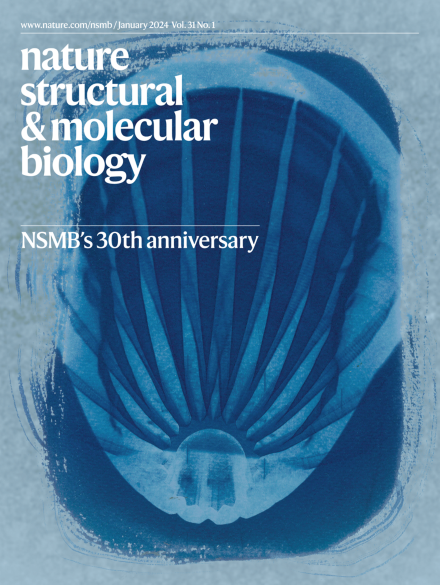艰难梭菌毒素B与VHH 5D复合物成孔片段的结构
IF 16.8
1区 生物学
引用次数: 2
摘要
艰难梭菌是一种机会性病原体,当肠道微生物群被抗生素或疾病破坏时,在结肠中形成。艰难梭菌感染(CDI)主要由TcdA和TcdB两种毒力因子引起。在这里,我们报道了一个3.87 a分辨率的TcdB全毒素晶体结构,在内体ph值处捕获了TcdB的独特构象。互补的生物物理学研究表明,TcdB的c端组合重复寡肽(crop)结构域是动态的,可以样品开放和封闭的构象,这可能有助于在中毒期间对环境和细胞信号的响应中调节TcdB的活性。此外,我们报道了三种TcdB-抗体复合物的晶体结构,揭示了抗体如何特异性抑制单个TcdB结构域的活性。我们的研究对TcdB全毒素的结构和功能提供了新的见解,并确定了可用于开发治疗CDI的新疗法和疫苗的内在脆弱性。本文章由计算机程序翻译,如有差异,请以英文原文为准。
Structure of the pore forming fragment of Clostridium difficile toxin B in complex with VHH 5D
Clostridium difficile is an opportunistic pathogen that establishes in the colon when the gut microbiota are disrupted by antibiotics or disease. C. difficile infection (CDI) is largely caused by two virulence factors, TcdA and TcdB. Here, we report a 3.87-A-resolution crystal structure of TcdB holotoxin that captures a unique conformation of TcdB at endosomal pH. Complementary biophysical studies suggest that the C-terminal combined repetitive oligopeptides (CROPs) domain of TcdB is dynamic and can sample open and closed conformations that may facilitate modulation of TcdB activity in response to environmental and cellular cues during intoxication. Furthermore, we report three crystal structures of TcdB-antibody complexes that reveal how antibodies could specifically inhibit the activities of individual TcdB domains. Our studies provide novel insight into the structure and function of TcdB holotoxin and identify intrinsic vulnerabilities that could be exploited to develop new therapeutics and vaccines for the treatment of CDI.
求助全文
通过发布文献求助,成功后即可免费获取论文全文。
去求助
来源期刊

Nature Structural &Molecular Biology
生物-生化与分子生物学
自引率
1.80%
发文量
160
期刊介绍:
Nature Structural & Molecular Biology is a monthly journal that focuses on the functional and mechanistic understanding of how molecular components in a biological process work together. It serves as an integrated forum for structural and molecular studies. The journal places a strong emphasis on the functional and mechanistic understanding of how molecular components in a biological process work together. Some specific areas of interest include the structure and function of proteins, nucleic acids, and other macromolecules, DNA replication, repair and recombination, transcription, regulation of transcription and translation, protein folding, processing and degradation, signal transduction, and intracellular signaling.
 求助内容:
求助内容: 应助结果提醒方式:
应助结果提醒方式:


